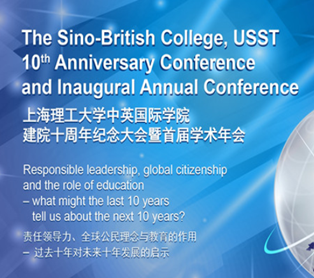
Time: 27/10/2016~28/10/2016
Venue: SBC Campus
Description:
The Sino-British College, USST
10th Anniversary Conference and Inaugural Annual Conference
In association with British Council and Greenleaf PublishingResponsible leadership, global citizenship and
the role of education – what might the last 10 years
tell us about the next 10 years?
Thursday 27th – Friday 28th October, 2016
SBC Campus, Shanghai
The Conference
Welcome to The Sino-British College, USST (SBC) 10th Anniversary Conference and Inaugural Annual Conference. The Conference is designed to provide a forum for discussion on the key themes of responsible leadership and global citizenship and the role of education institutions, particularly universities, in developing students who will behave responsibly throughout their careers and be capable of operating in different cultural contexts. The key themes are directly linked to SBC becoming, in March 2016, a signatory to the Principles for Responsible Management Education, an initiative of the United Nations (UN) Global Compact.
Aims
- To explore critically the concepts of responsible leadership and global citizenship and, in doing so, to consider developments in the last ten years and lessons for the next ten years.
- To consider the different international, sectoral and discipline experiences in relation to responsible leadership and global citizenship.
- To share the approaches adopted by different educational institutions, for instance with regards to pedagogy and the curriculum, in developing and measuring particular graduate characteristics relating to responsible leadership and global citizenship.
- To share ideas as to likely future developments, in particular countries, sectors or professions, to develop the themes of responsible leadership and global citizenship.
- To develop collaborations and networking between participants.
About SBC
The Sino-British College (SBC) is an international university college established as a Joint Venture (JV) by the University of Shanghai for Science and Technology (USST) and nine university members of the Northern Consortium UK (NCUK), i.e. University of Bradford; University of Huddersfield; Leeds Beckett University; University of Leeds; Liverpool John Moores University; Manchester Metropolitan University; University of Salford; The University of Sheffield; Sheffield Hallam University.
SBC was established in September 2006 following approval by the Chinese Ministry of Education (MoE). As a higher education institution and JV, it is unique in two respects. First, it is the only such JV involving British universities approved to operate in Shanghai. Second, it offers approved pathways to nine universities, allowing considerable choice, in terms of programmes and number and type of university, for students to continue their studies.
About The British Council
The British Council is a UK charity governed by Royal Charter. It is the UK’s leading international organisation for cultural relations and educational opportunities, operating in more than 100 countries with 8,000 staff – including 2,000 teachers – and each year engages with thousands of professionals and policy makers and millions of young people through the teaching of English, sharing the arts and delivering programmes related to education and society. In doing so, it creates international opportunities for, and builds trust between, the people of the UK and countries worldwide.
To undertake its activities, the Council receives a core publicly-funded grant, £864m in 2015, which constitutes 20% of turnover; the remaining 80% is generated from fee-based services (for example, English language classes and examinations), education and development contracts and from partnerships with public and private organisations. All the work of the Council is in pursuit of its charitable purpose and supports prosperity and security for the UK and globally.
In China, the Council operates as a Wholly Foreign-Owned Enterprise and is the Cultural and Education Section of the British Embassy in Beijing and Cultural and Education Section of the British Consulate-General in Shanghai, Guangzhou, Chongqing and Wuhan.
About Greenleaf Publishing
Greenleaf Publishing has been publishing leading research in sustainability, corporate social responsibility, business ethics, governance and environmental management for more than 20 years. It aims to produce books and journals that support leaders, managers, researchers and students by bridging the gap between academic theory and practical application.
The eCollections, the Greenleaf Online Library (GOL) and Sustainable Organization Library (SOL), are a perfect resource for: practitioners and consultants looking for practical and rigorous resources to inform strategies and support learning and development initiatives; researchers interested in business, management and cross-disciplinary aspects of sustainability and CSR; and MBA and management students wishing to take a lead on sustainability in their careers.
Greenleaf Publishing works closely with the UN Global Compact and PRME and launched the first Inspirational Guide for the Implementation of PRME at the 2012 UN Conference on Sustainable Development in Rio (“Rio+20”).
About Principles for Responsible Management Education (PRME)
The PRME were developed in 2007 by an international task force of sixty deans, university presidents and official representatives of leading business schools and academic institutions. The idea of developing a principle-based global engagement platform for academic institutions followed from a recommendation by all academic stakeholders of the UN Global Compact. The idea was officially introduced by the Global Compact Office at the Global Forum "Business as an Agent of World Benefit" at Case Western Reserve University in October 2006.
Under the coordination of the UN Global Compact and leading academic institutions, the PRME task force developed a set of six principles which lay the foundation for the global platform for responsible management education.
The PRME were first published at the 2007 UN Global Compact Leaders Summit in the presence of UN Secretary-General Ban Ki-moon and more than 1000 business, civil society, and government leaders in Geneva, Switzerland. There are now nearly 650 signatories globally.





